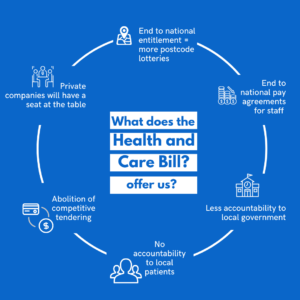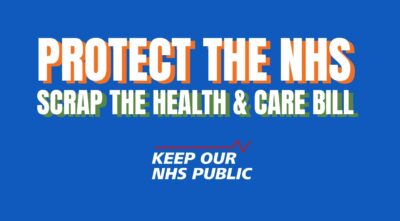The Health and Care Bill had its first and second reading in July 2021 and is now at the committee stage.
Campaigners are concerned about the possibility of another top down reorganisation of the NHS, following on from the Health and Social Care Act 2012 which was deeply unpopular. The changes outlined in this Bill are unwelcome as it will not solve any of the problems the NHS faces, and will distract from efforts to rebuild the NHS, while it is still dealing with the Covid pandemic. The main issues facing the NHS are understaffing, underfunding, and privatisation. The Bill will do nothing for the first two of these and will accelerate privatisation.
Integrated Care Systems
 One of the threats posed by the the Health and Care Bill is it will finalised plans to introduce Integrated Care Systems to the NHS. These will see England carved up into 42 Integrated Care Systems (ICSs), modelled on the Accountable Care Systems in the United States.
One of the threats posed by the the Health and Care Bill is it will finalised plans to introduce Integrated Care Systems to the NHS. These will see England carved up into 42 Integrated Care Systems (ICSs), modelled on the Accountable Care Systems in the United States.
Private companies will have seats on the ICS boards and be able to influence decisions about where NHS money is spent.
Contrary to much commentary about the proposed changes the Bill will not reduce privatisation. It will simply replace a regulated market with an unregulated market. Abolition of competitive tendering and the public contracts regulations will mean that NHS contracts will no longer have to be tendered but can just be handed out to any contractor, regardless of their track record or reliability, as we saw with the billions of pounds worth of contracts dished out to incompetent and wasteful companies, without competition, during the Covid pandemic. This Bill will mean that will become the norm.
ICSs will cover populations of 2-3 million people. They will be cash limited and have to make cuts to services including closing hospitals and reducing patients’ access to the care they need. Depending on the decisions each ICS makes there will be a postcode lottery of what services patients can expect to get – there will no longer be a national entitlement to a full range of services.
ICSs will have no transparency or accountability to local people, and very little accountability to local government who will lose many of their scrutiny powers including the right to oppose local NHS service reductions and closures. Decision making about local NHS services will be even more remote, centralised and unaccountable.
Threats to staff
ICSs may be able to set their own pay, terms and conditions for NHS staff, undermining national pay agreements and making it even more difficult to recruit and retain staff.
NHSE guidance mentions “inclusive employment models, workforce sharing arrangements and passporting or accreditation systems” to enable the workforce to be “deployed at different sites and organisations across (and beyond) the system, sharing practical tools to support agile and flexible working”. This will be a nightmare for staff, and make it harder to organise.
Further Reading
In this section Keep Our NHS Public has created a number of articles to help you explore the different ways the NHS is being privatised.
Read our definition of NHS privatisation.
You can find a summary of these on our page: How is the NHS being privatised?
Read in more detail about the different mechanisms being used to privatise the NHS:

